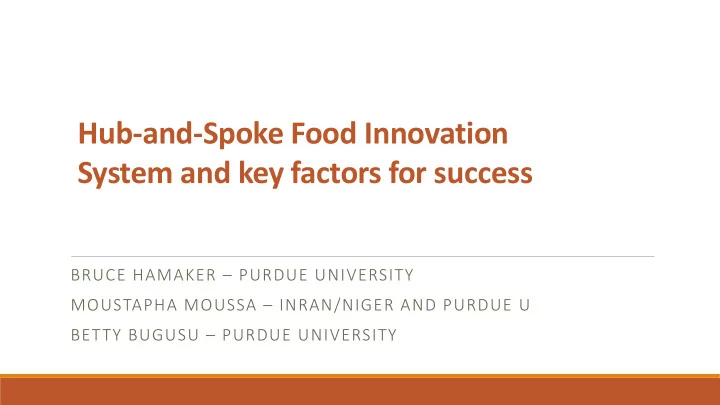

Hub-and-Spoke Food Innovation System and key factors for success BRUCE HAMAKER – PURDUE UNIVERSITY MOUSTAPHA MOUSSA – INRAN/NIGER AND PURDUE U BETTY BUGUSU – PURDUE UNIVERSITY
Goal Our aim is to create successful Hub-and-Spoke food innovation systems, using food and nutrition-related technologies, to: ◦ Expand local markets; process technologies and formulation emphasis ◦ Support entrepreneurism, and women and youth capacity building and empowerment ◦ Improve nutrition – locally focused market-driven fortification; promotion through nutritional or health-related attributes in local foods ◦ Create scale-up model 2
Hub-Spoke Food Innovation Model Diffusion out to remote villages Lebda, B. Faso Sherkin Haoussa, Maradi, Niger Rural Food Innovation Centers Central Food Innovation Center at INRAN • • Basic food processing technologies Food processing technologies • • R&D Women associations • • Detailed training – processing/nutrition Women association NIAMEY • • Establishment of rural markets Detailed training – processing/nutrition IC • • Market access for smallholder farmers Staff – food technologists, economist, • Sustainable aspect nutritionist, communication specialists Tera, Niger Gadan Iya, Maradi, Niger Falwell, Niger
Main Pillars • Central “Hub” food innovation center • Rural “Spoke” food processing and innovation centers • Communication between Hub and Spoke Teams • Data collection and documentation 4
Central “Hub” Food Innovation Center Food innovation center that backs-up the sub- center “Spokes” in rural and urban areas Essential requirements: ◦ Support by an institution ◦ Personnel – food scientists/technologists, equipment engineer/mechanic ◦ Over 50% time to project ◦ Value-chain and identification of products with market potential ◦ Processing equipment – the entire line to make high-quality commercial products ◦ Urban processors group linked with Hub ◦ Participate in product testing and promotion ◦ Provide guidance and backstopping to rural processors 5
Central “Hub” Food Innovation Center Essential requirements: ◦ Training staff with expertise in: ◦ Processing ◦ Food safety and sanitation ◦ Packaging and labeling ◦ Equipment maintenance ◦ Business skills (management, marketing, distribution, bookkeeping) ◦ Research and Development (R&D) function ◦ Business plan development 6
Rural Spoke food processing and innovation centers Essential requirements: ◦ Creation of women/youth associations/groups ◦ Linkage to local farmer organizations, and with access to improved varieties ◦ Support by community authorities (e.g. chief, mayor) and families ◦ Hub to give full responsibility and leadership in operation to rural women’s association (groups) ◦ Establishment of contract of partnership (MOU) between Hub institution and women’s association for operational funding ◦ Access to commodity production site ◦ Business plan development 7
Other requirements Communication between Hub and Spoke Teams ◦ Transportation to exchange information and technologies ◦ Information and communication technologies (ICT) (e.g. WhatsApp, email, etc.) ◦ Urban-urban ◦ Urban-rural ◦ Rural-rural ◦ Periodic follow-up and monitoring of on-going activities Data collection and documentation 8
Expected outcomes Gain market access for smallholder farmers ◦ Establish rural markets for processed foods Improve nutritional status ◦ Process nutritionally-enhanced foods that children want to eat, and with varieties farmers want to grow Women and youth empowerment ◦ Gain in knowledge ◦ Creativity enhancement Driver for adoption of new value-chain crop varieties ◦ Rural and urban and rural Business development – social and private entrepreneurship development ◦ Continuous training and technical support Increase income Improve livelihoods 9
Entrepreneurism Rural Women sell and establish rural markets High quality products draw repeat buyers and contracts Associations make profit (E.g., Falwel site, 2017, ~$1000) on annual sales of ~$2500 In ~4-5 years, documented to have involved 500 rural women in Niger, 100 in Burkina Faso Approximate cost per rural IC ~$15-20,000 10
Originally came from a small idea to work in rural communities, and has grown organically. Today, women and youth are empowered and are expanding the activities themselves Transformative Rural women associations are taking it on their own to train women at the rural level from surrounding villages/communities, and even Lebda, Burkina Faso financing their travel 40 women in processor association 2016 – 250,000 FCFA in savings In Gadan Iya, Niger, proceeds from processing first went to purchase “We see in the coming 10 years,… there will be no more farming each woman participant (16) a goat activities, ….. processing and marketing of grain products” The women recognize and express (through translation) openly the change and impact that Falwel, Niger have started to happen in their Daily service to 100 households lives as a result of the Incubation Center approach, and are not shy Highest production and sales to express it 11
Nutrition – children of women in the association are strong and healthy, and they prefer their products to those given at Health Centers Transformative In Sherkin Haussa, Niger, women at the rural level bought a bicycle for a husband, who was reluctant for his wife to go Farmers often are processors everyday to the processing center, and he now sells the products They use improved varieties directly into products surrounding villages for the women’s association Sustainable – driven by markets, government supported Through small investment, high and sustainable impact in rural Innovation – in Tera, Niger, women communities took an almost forgotten traditional Urban – benefiting individual fermented millet pasta product, and entrepreneurs with help of the INRAN IC, it is now Rural - transforming communities, commercialized spreads benefit 12
Acknowledgement of funding and support in-kind
Recommend
More recommend